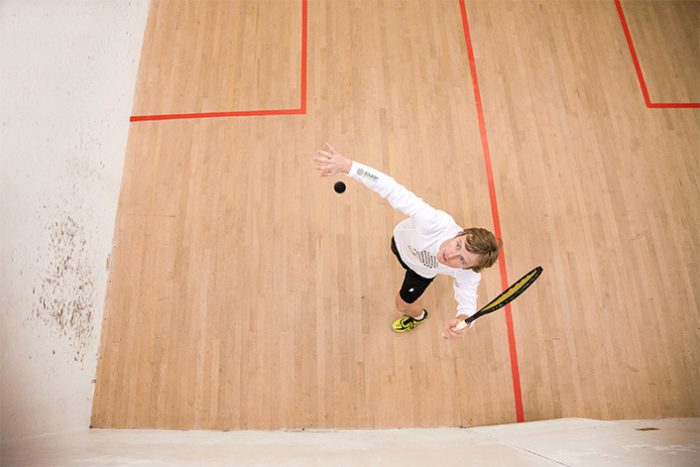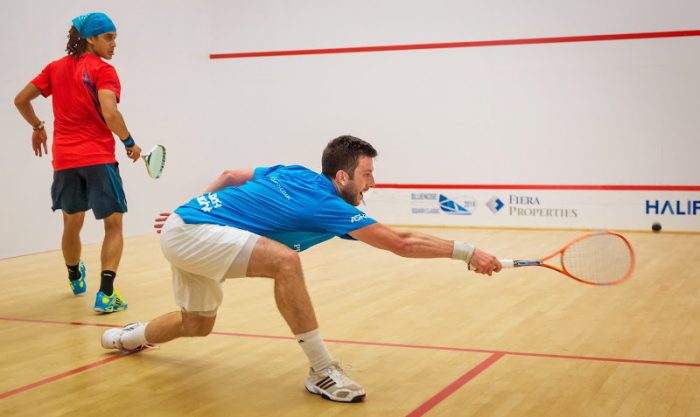Looking to take your game to the next level? Make sure you’re including these 3 crucial elements in your training.
1. Solo Practice
Most players unfortunately only have a limited amount of time to devote to working on improving their game. Whether it be work commitments, family responsibilities, or time taken up by other hobbies and social engagements, there is only ever going to be a finite amount of time left for our squash training.
Professional players, of course, will inevitably have more time to train and work on developing their game than the average amateur player.
 What time you do have however, needs to be spent as productively and efficiently as possible. So while most people might not have the same amount of time to train as the pro’s, they can still certainly aim to follow their lead in terms of the proportions of time spent on each various training element.
What time you do have however, needs to be spent as productively and efficiently as possible. So while most people might not have the same amount of time to train as the pro’s, they can still certainly aim to follow their lead in terms of the proportions of time spent on each various training element.
One of the aspects of training that is a huge part of most professional’s training regimes that is far less common at an amateur level is solo training.
Squash is almost unique as a racket sport in so far as the fact you don’t need a partner to have a good productive training session. Getting on court on your own to really groove in a certain shot or practice a specific technique, is something that can benefit players of all levels – it’s quite rare to see a club player spending time on this area however.
Your average professional player will spend at least a few hours a week on their own doing solo training. As an amateur player, just taking 15-20mins before a couple of your weekly games/training sessions to hit a ball on your own, can make a big difference to your game.
2. Play a variety of players
For all the training drills, coaching sessions, and partner routines, squash is ultimately about winning matches. If you want to improve as a player, you have to be playing regular practice matches.
What a lot of players fail to consider however, is the range and variety of opponents that they play against in their practice matches.
Ideally, you should be looking to get an equal proportion of games against three categories of player:
- Players a little weaker than you
- Players of an equal standard
- Players a little stronger than you
Your matches against these three different levels of opponent, will allow you to focus on different aspects of your development as a player.
Against the weaker players, it’s an opportunity to practice and incorporate the new things into your game that you’ve been working on in training. If you’ve been working hard on improving a particular shot, for example, it’s going to be difficult to suddenly start using that shot against tougher opponents when you’re under pressure.
By playing regular matches against players who are a little weaker than you however, you’ll invariably have a little more time on the ball to start utilising the shots that you’ve been practising in training, into a full matchplay situation.
Playing players that you know are a little stronger than you, on the other hand, is a chance to really gauge your overall improvements. Find players who you feel are just the next level above you (be realistic, don’t overreach too far), and use your matches against them to track how your skills are developing – record how many points you can win, see if you can start sneaking a game occasionally, or simply time the matches and see if you can keep your opponent on court a little longer.

Finally, your practice matches against players of a similar standard, are what you use to stay sharp and in form. Approach these games with a competitive mindset, but try and still maintain a focus on development and playing good squash, as opposed to just seeing it as ‘win at all cost’.
3. Get fitter
Anybody that has played at any level will be under no illusions as to how physically tough the game of squash is.
Squash is arguably just as much about your physical abilities, as it is about your technical and tactical prowess. Getting fitter can have just as large an impact on improving your game, as actually improving your technique and your strokes.
A lot of players pay lip service to getting fitter, but making a real effort to improve your physical attributes – and really sticking to it – will go a long way toward making you a better player.
Most players will actually also have a far bigger window for improvement in respect to getting fitter. Particularly for long-time players who’ve been playing and competing for periods of 15-20yrs+, it’s going to be a lot harder and will take a lot more dedicated time and effort to improve your actual technical abilities by a significant margin – whereas if you’re starting from a low base, physical improvements of 30-40% in your conditioning within a focused block of hard training are not unrealistic.
We’ve got a fantastic library full of different exercises, sessions, and programmes on the SquashSkills Training app for all levels and areas of fitness – adding in even just a few dedicated 15-20min ‘bolt-on’ workouts to your weekly training/matchplay sessions can go a long way to upping your fitness, and helping to take your game to the next level. To access the sessions and program on the Training app simply subscribe to SquashSkills.
Gary Nisbet
B.Sc.(Hons), CSCS, NSCA-CPT, Dip. FTST
SquashSkills Fitness & Performance Director
The World's Best Coaches At Your Fingertips
Working on your game has never been easier. The SquashSkills team will help you improve any aspect of your game, all built on solid foundations, utilising the best insight, experience, and top tips from the brightest minds the game of squash has to offer.
Check it out